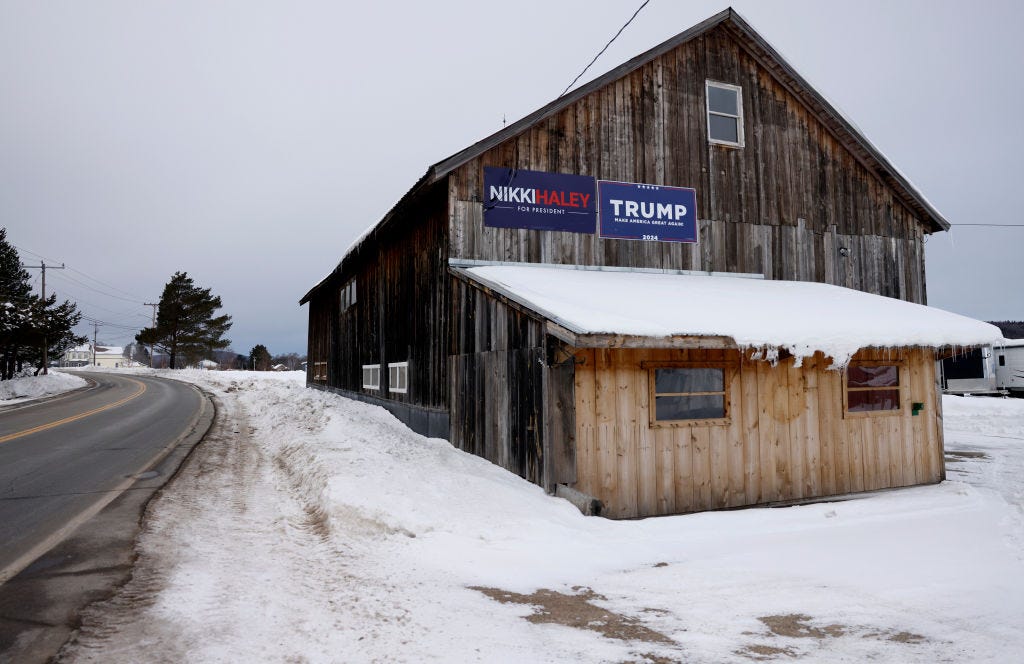Caught between "love with no help" and "help with no love"
On the right's failure to deliver for white rural America, the left's failure to see and embrace it, and why changing these dynamics is vital to beating back authoritarianism
If any one of the major social/economic/political transformations that occurred in the United States in recent decades had occurred on its own, it would be a huge deal.
The progress toward gender equality, with women playing the full range of roles they can and wish to, with all the effects on marriage, family, work, and social life
The rise of China, the choice to open trade with China, and the sucker punch that dealt to American manufacturing and, with it, the ladder of life in many places
The oligarchic hoarding of wealth and power since the early 1980s, the crushing of labor unions, crony capitalism, and the suffocation of opportunity for most people
The extension of rights and power and freedom to Black Americans from the civil rights era onward, and the browning of the country demographically because of immigration policy changes, and culture shifts from hearing once-silenced voices
The digital revolution, upending everything, shuttering industries, birthing new ones, making everything quickly obsolete
The climate crisis, progressively invalidating much of how we have lived and requiring rapid conversion to new ways
New ideas about gender and sexuality, about how people define who they are, and how people choose whom they love, that challenge millennia of received ideas
The fracturing of old media and old sources of authority for finding out about the world, and the rise of a more fragmented landscape, and the explosion of lies
The Covid pandemic and its still-in-process upheavals to patterns of work, human connection, and more
Now consider the fact that these changes didn’t happen one at a time. Rather, we have been living through all of them simultaneously.
We start with this long, tedious bullet-point list for a reason. This era has been a lot.
We often forget that it has been a lot. And this leaves us ill-equipped to take on rising authoritarianism — specifically, the growing demand for it at the grass roots, as opposed to the growing supply of it by party elites on the right, which tends to be the focus. It’s easier to ridicule Donald Trump than to ask why tens of millions of people are volunteering to contract what ails him.
It has been a consistent, if not widely embraced, theme of this newsletter that the popular demand for extremist, xenophobic, reality-challenged authoritarianism is much more dangerous and serious than the mere fact that craven political operators are willing to supply this demand. The real story is in the roots, not the leaves.
And there may be no better way to understand these roots than to start with a sense of what we have been living through as a country — the sheer amount of epic change.
Change is hard. People struggle to change their diet after a heart attack to stay alive. People struggle to change to save their marriages to people they desperately love. People struggle to change their habits to avoid contracting a potentially lethal virus.
So when you think about our era, think about the fact that, simply to stay afloat, be seen as a good person, continue to feed your family, feel in-the-know, have a stable sense of your identity, and so on, most people have had to adapt to a lot of change.
Some people are crushing it. Many people. But a lot of people are not crushing it. People of all backgrounds who find the future bewildering, these changes confusing, who resent having to remake themselves simply to endure, who feel mocked by the future. There are men who feel this way and women, white people and people of color, old people and young people. But the more of these changes you personally experience as a headwind rather than a tailwind, the worse it is.
The two major political parties in America are aware of these dislocations brought on by changes that in many ways they enacted. But when it comes to answering this sense of dislocation — particularly when it comes to populations that are older, more rural, whiter, more male, who have suffered the dislocations that most of us have suffered without some of the countervailing gains that women and people of color and people connected to global networks and people facile with new technologies have experienced — the two parties have almost diametrically opposed propositions.
The left offers help but no love, and the right offers love but no help.
The Democratic Party’s approach has tended to be policy-centric. Lost your job in the shift to green energy since coal mining doesn’t make economic sense anymore? Sure, we’ll train you for a new career. But what about helping you process the basic threat that shift poses to your sense of what it means to be a breadwinner, a community member, a man where you live — to matter?
For that, you’re on your own.
Unfortunately, that has tended to be the Democratic response to people affected by parallel upheavals in the agricultural and manufacturing economies that have changed drastically in rural America. Democratic administrations have repeatedly proposed serious policy solutions for rural America’s problems, without recognizing the affective problem underneath.
It’s as if Democrats say: “We’re sorry you lost the things that defined you — here’s a new career, and some stopgap funding, and an infrastructure program so you can take advantage of the new stuff.” It fails to land.
And that’s opened the door to a very different approach on the right.
Republicans don’t even try to offer economic help, because dislocated everyday Americans are not their actual base. Billionaire donors are. But while they refuse to offer material help, in fact because they refuse to offer it but still need some way of competing for votes, they instead offer love — or, you could say, recognition.
They say, “Those pointy-headed elites and those dark people and migrants screwed you over, and you’re right to be mad. We feel your pain. We see you. We are outraged with you.” And they can leave it at that.
And so large swaths of America struggling to cope with an era of economic capture and constant crisis and a high cost of living and technological creative destruction and bona fide social progress, and more, are caught between help with no love and love with no help.
That’s some of what White Rural Rage, the new book from political scientist Tom Schaller and journalist Paul Waldman, is about. Schaller and Waldman explore how the right took power in rural America by promising emotional support rather than economic gains, and how the Republican Party has taken advantage of the malapportionment of political power to the rural states in the Senate and the Electoral College to build on that power at minimal political risk — aside from the very serious threat that imbalance poses to American democracy.
In the interview below, we talk to Waldman about how the country came to this point, what happened to the American tradition of progressive populism, how rural Americans can ask for better from their representatives, and what political leaders looking to actually rescue democracy need to be saying right now.
At the heart of the book is an argument that the Republican Party has paid back rural Americans for their support purely in emotional gains. No one is looking to deliver them material gains or to solve their problems — in fact, Republican policies make things worse. Why is the right better at telling a story that's engaging for rural Americans? Or is the left just not telling any story at all?





